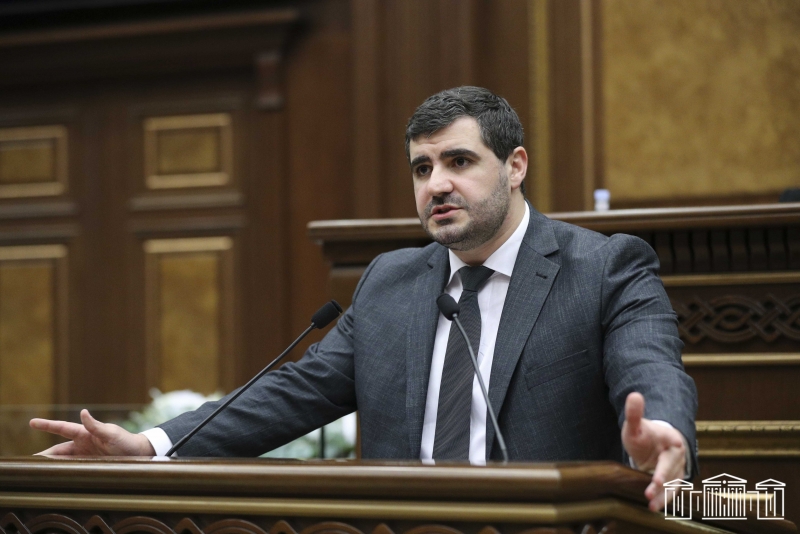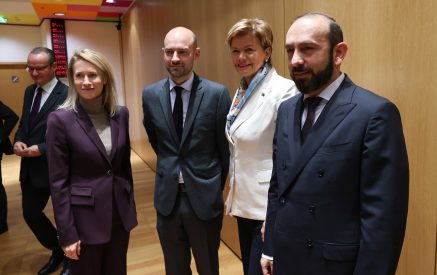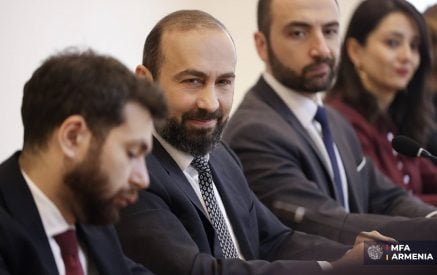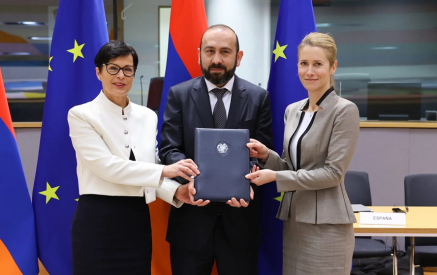The NA Standing Committee on European Integration convened parliamentary hearings on “New Perspectives and Challenges of the European Integration of Armenia.”
In his opening speech Arman Yeghoyan touched upon in detail the process of the establishment of the RA and EU diplomatic relations and the legal-contractual field regulating the relations.
He underscored that Armenia passed a stage of important relations in the years of 2000s. in a period, when 10 Eastern European states immediately became members of the European Union (EU). “At that time, first, the European Neighbourhood policy, then – the Eastern Partnership policy launched, and Armenia was participant for both of them. In this period the Government of Armenia began the negotiations on the Association Agreement with the EU,” the Committee Chair said and added that after negotiating on this Agreement and completing it, however in September 2013 the Republic of Armenia refused signing it and became member of the Customs Union. Arman Yeghoyan stressed that, nevertheless, that the negotiations with the EU had not stopped, as the main problem of the Association Agreement was the part of the free trade. The negotiations continued, the document, the Comprehensive and Enhanced Partnership Agreement was signed, which is the same Association Agreement without the part regarding the free trade.
In 2018, a part of the Agreement provisions entered into force, and being ratified by the EU all member states, it completely entered into force from March 1, 2021.
Read also
As the Committee Chair assessed, this Agreement is definitely an underestimated document in our society, also in the expert circles. “I mean that in the event of carrying out all the provisions of the Agreement in force (in case of implementing not formally, but substantially and with quality), we can say that the RA European integration process will go several steps forward. This is the same Agreement that Georgia, Ukraine, Moldova have without the part of the free trade,” the rapporteur underscored. He reminded that the issues concerning almost all spheres are regulated by the document. “We do our best in order to implement the provisions of this Agreement with high quality,” Arman Yeghoyan assured.
Regarding the geopolitical changes, he recorded that after 2020, the European Union has noticeably been active in our region, which has its reasons. In 2021, the EU proposed Armenia a new economic and investment project with 2.6 billion Euro support package. At this time, already 550 million Euros have been targeted out of this sum, and the great part was to be considered the privileged loans supporting the small and medium business. The other part refers to the capital expenditures.
Giving details on the EU activity in the region, Arman Yeghoyan noted that the EU increased its geopolitical presence in the region after the attack against the sovereign territory of Armenia in 2022. In terms of the practice of the EU institutes, within incomparably short terms a decision was made to send a temporary civilian Observation Mission to Armenia, and the EU made a decision on deploying already a permanent Observation Mission in January 2023. “It is difficult to underestimate the role of this Mission in ensuring the security of our state,” the rapporteur documented and reminded that this is the biggest of the EU 13 civilian missions in number of people. Recently, by the decision of the EU the number of the observers became 209 from 138.
Speaking about the agenda of the RA-EU relations, the Committee Chair mentioned that Armenia applied to the EU with a proposal of making use of the European Peace Facility (EPF). This is a security Facility, which provides supports of different character to the states. According to him, this issue is at the phase of discussion.
Recently, the EU-Armenia Partnership Council reached an agreement on beginning an activity on the EU-Armenia Partnership new agenda, setting more ambitious joint priorities for cooperation on all planes. “It refers to the political commitment, political document, which at this moment is also at the stage of elaboration, and we expect that its elaboration will complete in May-June,” the Committee Chair informed.
In the development of the RA-EU relations Arman Yeghoyan underlined the role of the European Parliament and added: “The European Parliament is the flagman of the development, improvement and deepening of our relations and tries also to advance this agenda in other institutes.” In this context he referred to the reports being adopted on security and foreign policy, also the last resolution on the improvement of the RA-EU relations.
“Both the European Union and Armenia agree that it has never been such dynamic process for further development of bilateral dialogue and relations,” the Head of the Delegation of the European Union to Armenia Ambassador Vassilis Maragos underscored.
Speaking about the Comprehensive and Enhanced Partnership Agreement, the rapporteur highlighted the complete implementation of the Agreement, focusing especially on the regulations, their alignment and reforms.
Regarding the implementation of the economic and investment projects, Vassilis Maragos underscored: “We have created investment coordination platform with the RA Government and the international financial institutes, which combines all concerned sides and is aimed at reviewing the flagman projects and understand what actions should be taken to accelerate the implementation of the up-to-date investments.”
It was noted that the European Union made investments in a number of spheres and continues its activities in Syunik. “We have mobilised together with the EU member states more than 120 million Euros in Syunik on more than 35 projects within the framework of the Team Europe initiative, the rapporteur underlined.
Vassilis Maragos mentioned that most of the people in Armenia are focused on security problems and added: “In the security sphere we have advancement of bilateral cooperation. The European observes the issue of supporting the RA armed forces to strengthen the capacities.”
According to the Head of the EU delegation, the European Union continues to be committed to the stabilization and settlement of the situation in the region.
“The EU-Armenia cooperation is important for the rule of law. Tomorrow, in Brussels we are going to sign a document on cooperation with Armenia within the framework of Eurojust, which will deepen the cooperation in the framework of criminal cases and will provide high criteria for protection of personal data, judicial independence and rule of law,” the rapporteur noted.
Vassilis Maragos also spoke about the support provided to the refugees by the EU and stated: “The EU with the member states mobilised more than 60 million Euros for humanitarian and budgetary support. We discuss with the RA Government the issue of providing additional support.”
It was noted that the European Union is ready to further deepen the bilateral partnership. “We’ll continue to work hard to strengthen our ties, being based on our commitment, joint values, as well as our devotion to the international order based on laws and right,” Vassilis Maragos said, concluding his speech.
The participants highlighted the holding of the hearings, talked about the perspective of the EU membership of Armenia, noting that it requires considerable work, and our country should go in that direction. The strengthening of the sovereignty of the Republic of Armenia and the protection of its territorial integrity was considered a major issue. In this context, it was mentioned that integration with the European Union can become a real toolkit for solving security problems.
An opinion was voiced that in parallel to the Government’s actions, a national referendum should be held in the country so that Armenia’s European integration is not the decision of one political power. It was noted that full membership will open greater opportunities for cooperation and investment, promoting creation of workplaces, innovation and improving the standard of living of the citizens.
In the speeches, in the context of the structural changes of the Government, a proposal was made to create a European Integration Commission or a Ministry. It was emphasized that being the EU member does not mean being limited only to the EU: It is an opportunity to enter wider markets with the EU support. It was pointed out that in case of conducting a multi-vector foreign policy, it will be possible to make the risks encountered on the path of European integration as manageable as possible. The relations with Russia and the review of bilateral inter-state agreements in this regard, the issue of leaving the CSTO, internal security issues were addressed. The participants exchanged ideas on the meeting of the RA Prime Minister Nikol Pashinyan, the President of the European Commission Ursula von der Leyen and the U.S. Secretary of State Antony Blinken in Brussels tomorrow, on April 5. The speakers also talked about the military, economic and cultural security of our country, the promotion of the European agenda, the current geopolitical developments and the challenges arising from them and other issues.
The deputy of the RA NA Civil Contract Faction, the Deputy Chair of the Standing Committee on Economic Affairs Babken Tunyan spoke about the issue of exporting Armenian products to European markets in the context of European integration, noting that we must first be able to produce goods suitable for European markets.
“It is a very complicated matter, standards, control over them, change of business mentality, appropriate profitability are necessary. The Government is working intensively in the direction of all this,” Babken Tunyan underscored and stated: “We must record a circumstance: If we say European integration, do we mean the status, the process, or is it primarily the quality of our society’s economy, social and legal life?” According to him, emphasis should be placed on content rather than formal processes.
“Taking into consideration the risks, benefits and harms, the Armenian Government will lead the country in the direction that will ensure a higher level of security, better welfare and a happier citizenry for our country. You can discuss the terms and speed of that path, but no one should have any doubt about the determination,” the deputy stated.
In his extraordinary speech, Arman Yeghoyan highlighted the opinions and positions expressed. According to the Committee Chair, the aim is to understand what new prospects are open for Armenia at the moment, and what new challenges each opportunity can lead to. He stated that European integration is a multi-stage and multi-layered process, it is the adaptation of the internal order to the European standards. “Our task is to competently continue the work, form correct, accessible, affordable expectations and serve those expectations,” the Committee Chair underlined and expressed readiness to cooperate with all the concerned parties.
The NA deputies, the representatives of the Ministry of Foreign Affairs, the European Union delegation, the representatives of various parties, organizations dealing with the European integration issues, and independent experts attended the parliamentary hearings convened on April 4.
National Assembly of the Republic of Armenia






















































